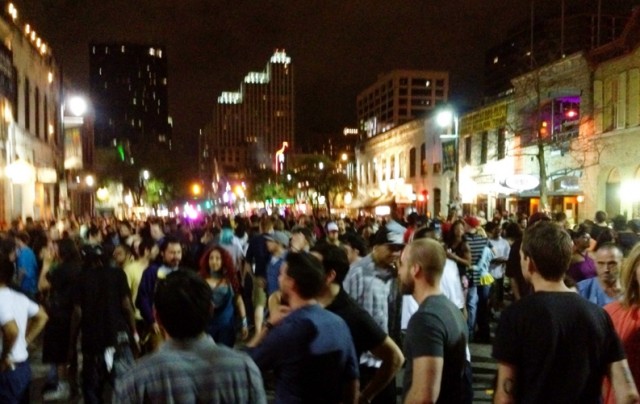
The manager of a hip dive bar that features nightly live music in East Austin has joined the battle to help keep rideshare companies Uber and Lyft operating in the state capital. Samantha Phelps, a booking and marketing manager for Stay Gold Austin, petitioned the Texas Supreme Court last week to intervene in an upcoming vote on rideshare regulations.
Phelps, backed by Uber, argued the ballot language was unclear and misleading. But the court sided with the city and denied her request without comment on Monday.
A battle against Uber and Lyft, led by District 5 Councilwoman Ann Kitchen, resulted in restrictions on rideshare companies. The Austin City Council voted 9-2 in December to regulate Uber and Lyft drivers similarly to the taxicab industry, requiring them to pass the city’s 10 point fingerprint-based background checks.
Misleading ballot language
In May, citizens will be given the chance to vote on the regulations. But Phelps and others say that the ballot language is too confusing, and was designed as such by the city in order to sway voters.
“The council falsely portrayed the proposed ordinance as something that only takes away and does not give,” Phelp argued in her court filing. “That portrayal could not be further from the truth. … The approved ballot language is purposely skewed to persuade the public to vote against the proposition.”
The current ballot language is as follows:
Shall the City Code be amended to repeal City Ordinance No. 20151217-075 relating to Transportation Network Companies; and replace (it) with an ordinance that would repeal and prohibit required fingerprinting, repeal the requirement to identify the vehicle with a distinctive emblem, repeal the prohibition against loading and unloading passengers in a travel lane, and require other regulations for Transportation Network Companies?
District 6 Councilman Don Zimmerman also finds the wording to be unclear. “You lose this, you lose this, you lose this,” he told the Austin American-Statesman, “and you gain nothing.”
Zimmerman, along with Uber and Lyft, favor a much simpler version they say is more understandable:
Shall the current city ordinance that regulates Transportation Network Companies (“TNCs”) be repealed and replaced with an ordinance that requires the TNCs to pay 1 percent of their gross revenues, imposes safety regulations and provides a penalty for violations?
Councilwoman Ellen Troxclair, who has voted alongside Zimmerman not to regulate rideshare companies similarly to the taxicab industry, told the Statesman that the City Council’s ballot language is an obvious attempt to influence voters.
“This is a clear effort to sway voters,” said Troxclair ahead of the council’s December vote. “I’m just absolutely shocked at the length this council is willing to go to say to the voters that the council knows better than they do,” she later added.
The fate of Uber and Lyft in Austin
The debate over whether to regulate rideshare operators in Austin continues to remain front and center, particularly as thousands of techies descend on the capital during its annual South by Southwest festival.
Even President Obama joined the conversation when he attended the festival on Friday to try and recruit some of the tech industry’s finest innovators in an effort to help modernize government.
The battle between rideshare companies and city officials is far from over despite an Austin city clerk’s decision to throw out a citizen-led recall petition against Kitchen. The petition was rejected on a technicality after the clerk refused to accept it because each of its 989 pages were not signed in front of a notary.
The political action committee behind the recall effort confirmed that the fight isn’t over.
“They think we’re going to give up or something,” Rachel Kania, co-founder of Austin4All, told the Guardian. “We’re just getting started.”
Kania, along with Tori Moreland, founded Austin4All in response to Kitchen’s attack on rideshare in Austin. The group describes itself as being “pro-growth, pro-innovation, and pro-technology.”
Sources:
http://kxan.com/2016/03/14/texas-supreme-court-denies-stay-for-ridesharing-ballot-language/

